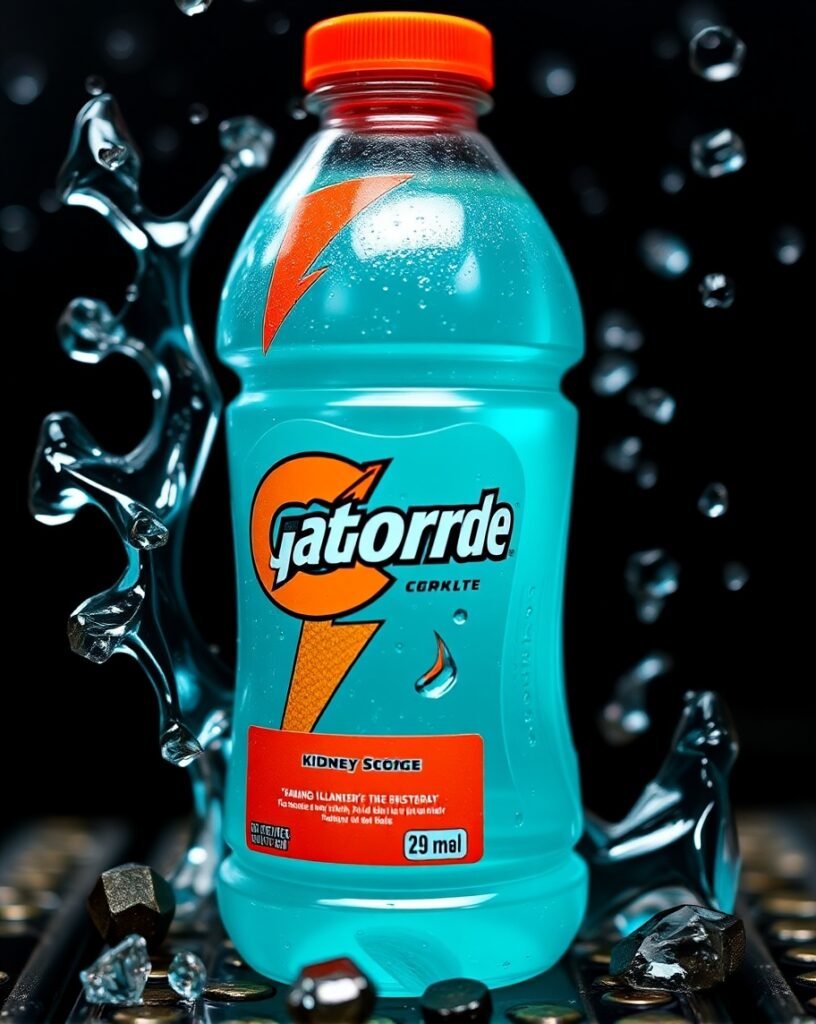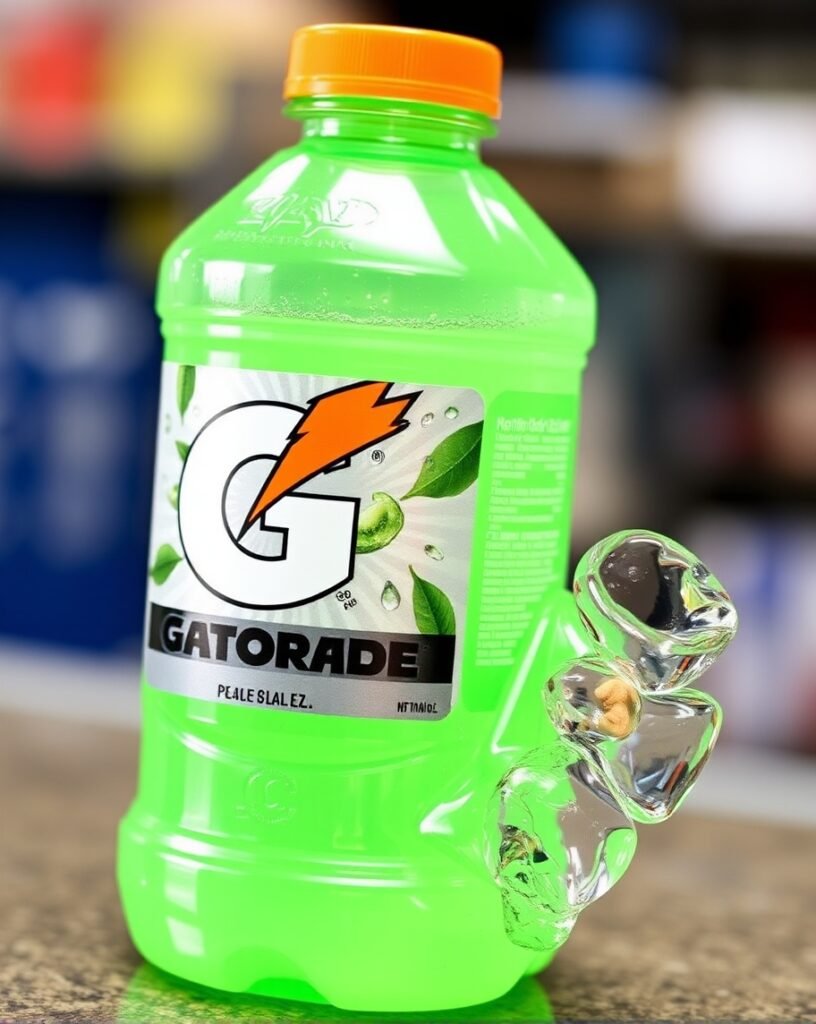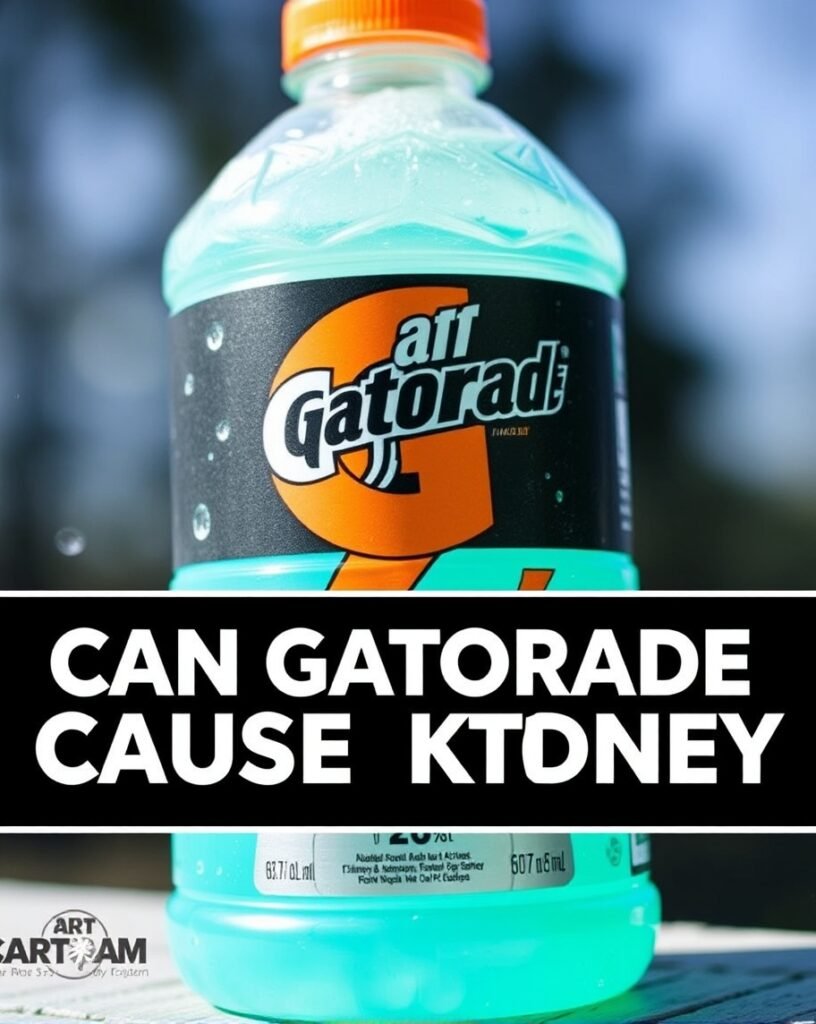Table of Contents
Can Gatorade Cause Kidney Stones? Discover 5 Ways It Influences Kidney Stone Formation and Hydration

for Optimal Health
Introduction:
Exploring Gatorade’s Impact on Kidney Health
can gatorade cause kidney stones :The role of hydration in preventing kidney stones is well-known, and Gatorade, with its electrolyte-enhanced formula, often serves as a popular choice. However, some have raised concerns about whether Gatorade could contribute to kidney stone formation. This post delves into the science behind Gatorade’s ingredients and their potential effects on kidney health, providing practical advice for optimal hydration.
What Exactly Are Kidney Stones and How Do They Form?
Kidney stones are hard mineral deposits that form in the kidneys due to a high concentration of certain substances in the urine. The main types are:
Calcium Oxalate Stones: These are the most common and can be influenced by high oxalate and calcium levels.
Uric Acid Stones: Common in those with low urine pH or high protein intake.
Struvite Stones: Often form due to urinary tract infections.
Cystine Stones: A rare, genetic type caused by excessive cystine in the urine.
Each type has different contributing factors, but hydration plays a crucial role in diluting these substances and reducing the risk of stone formation.
The Role of Hydration in Preventing Kidney Stones
Why Staying Hydrated is Crucial for Kidney Health
Kidneys require water to filter waste and maintain balance. Dehydration can lead to concentrated urine, increasing the likelihood of stones. The optimal hydration level keeps urine diluted, lowering the risk of stone-forming crystals.
Comparing Water and Sports Drinks Like Gatorade for Hydration
Water is the preferred choice for staying hydrated due to its purity and lack of additives. However, Gatorade offers electrolytes, which can be beneficial under specific conditions like high-intensity exercise. We will compare their effectiveness for kidney health and explore when each may be appropriate.
Ingredient Breakdown: What’s Inside Gatorade?
Gatorade’s main ingredients include water, sugar, sodium, potassium, and artificial colors and flavors. Here’s a closer look at each component:
Electrolytes: Sodium and Potassium’s Role in Hydration
Importance for Hydration: Electrolytes regulate fluid balance and are essential after heavy sweating.
Impact on Kidney Health: Excessive sodium can increase calcium excretion in urine, potentially raising kidney stone risk.
Sugar Content: Weighing the Pros and Cons
Energy Boost: Sugar provides a quick energy boost, especially useful during workouts.
Potential Risks: High sugar levels can raise calcium levels in urine, which may contribute to stone formation. We analyze the sugar content in Gatorade and its implications for kidney health.
Sodium Levels: Necessary for Rehydration, But Risky in Excess
Role in Gatorade: Sodium helps the body retain fluids, but too much can strain the kidneys.
Risks for Kidney Stone Patients: People prone to stones may want to limit sodium, as it can elevate calcium in urine, increasing the risk of stone formation.
Artificial Colors and Additives: Understanding Their Impact on the Body

Additive Concerns: Gatorade contains artificial colors like Yellow 5, which has been scrutinized for potential health risks.
Kidney Impact: While these additives are approved by regulatory bodies, some individuals may prefer to avoid them, particularly those with kidney sensitivities.
Citric Acid: Could It Help or Harm?
Kidney Stone Prevention: Citric acid can inhibit calcium oxalate stone formation by binding with calcium in the urine.
Presence in Gatorade: Gatorade contains citric acid, which might provide some protective benefits against certain stones.
Gatorade vs. Water: Which is Better for Kidney Stone Prevention?
Benefits of Water for Kidney Health
Hydration Without Additives: Water dilutes urine effectively without adding sugar or sodium.
Cost and Accessibility: Water is affordable and widely accessible, making it an ideal choice for daily hydration.
Gatorade’s Unique Advantages and Drawbacks
Electrolyte Replenishment: Gatorade is beneficial in situations where electrolyte loss is significant, such as prolonged exercise.
Balancing Risks: For those at risk of kidney stones, the added sugars and sodium might counteract the hydration benefits.
Is Gatorade Safe for Those Prone to Kidney Stones?
Who Should Be Cautious About Gatorade Consumption?
People with a history of kidney stones or conditions like hypertension might need to be cautious. We outline who should limit Gatorade and why alternatives might be more suitable.
Practical Advice for Minimizing Risk While Consuming Gatorade
For those who still want to enjoy Gatorade, moderation is key. We discuss how to balance Gatorade intake with plenty of water and ways to monitor your body’s response.
Alternatives to Gatorade for Kidney Health
For individuals seeking kidney-friendly hydration options, here are some alternatives:
Coconut Water: A natural source of electrolytes with less sugar.
Electrolyte Tablets: Customizable electrolyte replenishment without added sugars.
Infused Water: For flavor without additives, try infusing water with fruits like lemon and cucumber.
The Importance of Consulting a Healthcare Professional
Before making changes to your hydration routine, especially if you’re prone to kidney stones, it’s important to seek professional advice. A healthcare provider can help you tailor your hydration plan to your specific needs, ensuring safe and effective strategies.

FAQs
Can Gatorade Cause Kidney Stones?
Excessive consumption may contribute to kidney stone formation due to high sugar and sodium content.
Are there kidney-friendly sports drinks?
Yes, consider low-sugar, low-sodium options or consult with a healthcare provider.
How much Gatorade is safe to drink daily?
Limit intake based on individual health conditions; those with kidney stone risk should prioritize water.
What’s the best hydration method to prevent kidney stones?
Drinking water is most effective; avoid high-sugar and high-sodium drinks.